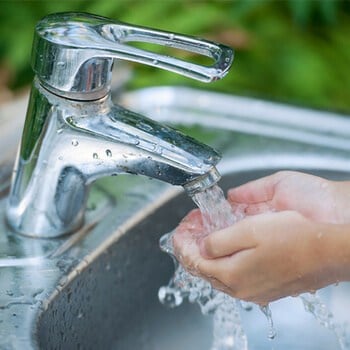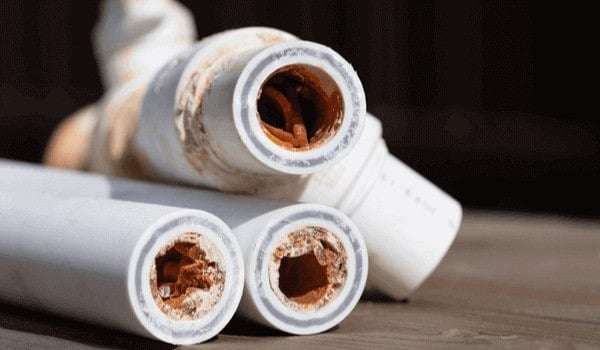Your drinking water does more than quench your thirst—it carries minerals picked up from the earth. Some are good for your health, others can cause trouble for your home.
Let’s a closer look at the mineral content in your tap water and how it affects your health and home.
| ✅ Quick Facts | |
|---|---|
| Most tap water contains trace minerals | Picked up from rocks and soil as water moves through the ground. |
| Common minerals | Calcium, magnesium, sodium, iron, and fluoride. |
| Some improve health | Others affect plumbing or taste. |
| Hard water = high mineral content | Can lead to limescale, stains, and appliance wear. |
| Testing is easy | Request a water report or use an at-home kit like Tap Score. |
How Do Minerals Get into Tap Water?

Minerals are everywhere—in dirt, rock, and sand. When it rains, water picks them up as it seeps through the ground and into rivers, wells, and aquifers.
Not all water has the same mix of minerals—it depends on the geology in your area. Most minerals occur naturally, but in some cases, they’re added by city water systems or bottled water companies to boost taste or health perks.
What Minerals Are in Tap Water?
Most tap water contains a mix of naturally occurring minerals—some essential, some annoying.
Here’s a quick look at the most common ones:
| Mineral | What It Does | Common Source |
|---|---|---|
| Calcium | Supports bones, causes scale | Groundwater, limestone |
| Magnesium | Helps nerves and muscles | Bedrock, aquifers |
| Sodium | Balances fluids, softens water | Water softeners, soil |
| Iron | Oxygen transport in blood | Well water, old pipes |
| Fluoride | Protects teeth (in small amounts) | Added to public water |
| Sulfur | Occurs naturally, can cause odor | Groundwater (as H2S gas) |
| Zinc | Boosts immunity | Trace amounts in minerals or pipes |
Notable Minerals Worth Knowing About
Calcium & Magnesium: These two cause most of the “hard water” issues you’ll see—limescale, soap scum, and cloudy dishes. But in small amounts, they’re good for you.
Sodium: If you have a salt-based water softener, sodium levels can climb. Not dangerous for most people, but it might not be great for low-sodium diets—or your plants.
Fluoride: Added to most public water systems for dental health. Still debated in some communities, and many people choose to filter it out.
Iron & Sulfur: These don’t pose a health risk, but they can cause staining and give your water a metallic taste or that “rotten egg” smell.
Are Minerals in Tap Water Regulated?

The EPA checks drinking water for minerals that could affect your health. Some—like copper and fluoride—have legal limits. Others aren’t harmful, so the rules focus more on how they affect taste or smell.
Most, however, are only subject to secondary drinking water standards for aesthetic effects — how they make water look, smell and taste.
The US Food and Drug Administration (FDA) regulates minerals in bottled water products labeled as:
- Bottled water
- Drinking water
- Mineral water
- Sparkling mineral water
- Spring water
- Purified water including demineralized, deionized and distilled water
Carbonated mineral water, tonic water and seltzer are regulated as soft drinks.
Does Bottled Water Contain Minerals?
The FDA defines bottled water as water for human consumption that’s sealed in bottles and contains no added ingredients. Most brands are filtered tap water, so they contain minerals and fluoride within EPA limits.
Some products, however, must meet stricter definitions. Bottled mineral waters, for example, must come from underground sources and contain at least 250 parts per million (ppm) of total dissolved solids. And all minerals must come from the source — they can’t be added later.
The most common minerals in bottled mineral water are:
- Calcium carbonate
- Magnesium sulfate
- Potassium
- Sodium sulfate
Manufacturers can, however, can add minerals to ordinary bottled water to balance its taste and give it a more refreshing quality, as long as they don’t label it as natural mineral water. Water with fewer than 250 ppm of total dissolved solids are called spring waters.
Does Drinking Mineral Water Have Health Benefits?

The scientific consensus is that most people get adequate mineral intake from the food they eat, but studies show that North Americans could boost their intake by over 15 percent simply by drinking tap water with high mineral content. It’s a health benefit too good to ignore.
Research shows mineral water intake may:
Improve Heart Health
Postmenopausal women who drank a liter of mineral water daily for two months lowered their bad (LDL) cholesterol (LDL) and increased their good (HDL) cholesterol. And studies of people with hypertension showed a significant decrease in blood pressure — a risk factor for cardiovascular disease — after just four weeks of daily mineral water consumption.
Relieve Constipation
Low magnesium intake is associated with constipation. Magnesium draws water into the intestinal tract, aiding with regular bowel movements by relaxing intestinal muscles and improving stool consistency.
A form of magnesium is found in most over the counter (OTC) constipation remedies.
Alleviate Heartburn
Calcium and magnesium are two popular ingredients in OTC heartburn medications. Mineral water is the treatment of choice for dyspepsia in nations across Europe.
How Can I Find Out What Minerals Are in My Drinking Water?

It’s always wise to know what’s in your tap water. If you drink from a public water source, contact your utility company for a copy of your annual consumer confidence report. Mandatory under the Safe Drinking Water Act, it tells you everything you need to know.
If you have a well, testing is up to you. The CDC recommends an annual water test for pH, nitrates, bacteria and total dissolved solids.
You can have your water tested by a local lab, but we like SimpleLab’s Tap Score test kits. They offer panels curated for both city and well water. If you drink bottled water regularly, you can even test your favorite brands. Results come with expert, unbiased advice on water treatment products.
How Do Tap Water Minerals Affect My Home?

Minerals in water may be good for your health, but too many are bad for your home.
Large quantities of calcium and magnesium in water form limescale, a chalky buildup in your plumbing system that leaves unsightly stains on your dishes, clothing and bathroom fixtures while reducing the efficiency of your water heater and appliances. Called hard water, it’s a costly issue for which you may want a water softener or water conditioner.
Iron and manganese can also cause staining, damage appliances and encourage the growth of iron and manganese bacteria, living organisms that feed on these dissolved minerals. And if you have a problem with sulfur gas, you don’t need anyone to tell you about the lingering rotten egg stench it can leave in your house.
For these problems, there are thankfully filters that offer solutions.
Final Thoughts
Minerals in water can be a blessing or a curse. As with all things in life, they’re best in moderation.
 157 people found this helpful. Was this guide helpful to you?
157 people found this helpful. Was this guide helpful to you? 

